|
|
|
Sort Order |
|
|
|
Items / Page
|
|
|
|
|
|
|
| Srl | Item |
| 1 |
ID:
119961
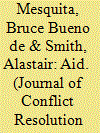

|
|
|
|
|
| Publication |
2013.
|
| Summary/Abstract |
Temporary membership on the United Nations Security Council (UNSC) has pernicious effects on the political and economic development of nations, particularly in nondemocracies. The leaders of rich democratic states often trade resources for the salient policy favors that UNSC members can deliver. This provides the leaders of temporary UNSC members with access to "easy money" resources. Such resources have deleterious consequences, particularly in nondemocracies, because they provide leaders with the means to pay off their coalition of supporters without reliance on tax revenues. While foreign aid is an important form of easy money bribe, it is but one of many. Empirical tests show loans are a substitute means for bribing UNSC members.
|
|
|
|
|
|
|
|
|
|
|
|
|
|
|
|
| 2 |
ID:
058793
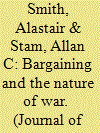

|
|
|
| 3 |
ID:
076882
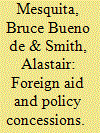

|
|
|
|
|
| Publication |
2007.
|
| Summary/Abstract |
We model foreign-aid-for-policy deals, assuming that leaders want to maximize their time in office. Their actions are shaped by two political institutions, their selectorate and winning coalition. Leaders who depend on a large coalition, a relatively small selectorate, and who extract valuable policy concessions from prospective recipients are likely to give aid. Prospective recipients are likely to get aid if they have few resources, depend on a small coalition and a large selectorate, and the policy concession sought by the donor is not too politically costly. The amount of aid received, if any, increases as the recipient leader's coalition increases, the selectorate decreases, the issue's salience increases, and the domestic resources increase. The theory explains why many Third World people hate the United States and want to live there. Empirical tests using the U.S. Agency for International Development data for the post-World War II years support the model's predictions.
|
|
|
|
|
|
|
|
|
|
|
|
|
|
|
|
| 4 |
ID:
065781
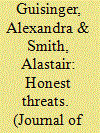

|
|
|
| 5 |
ID:
066284
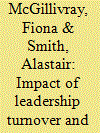

|
|
|
| 6 |
ID:
057735
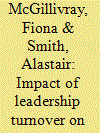

|
|
|
| 7 |
ID:
190763
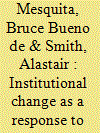

|
|
|
|
|
| Summary/Abstract |
Leaders shift political institutions to ameliorate threats to their tenure. The masses might rebel to replace the leader and change institutions. Disloyalty by political insiders might result in a coup. Leaders liberalize when the masses present a greater threat and ‘autocratize’ to dissipate threats from elites. A two-step procedure tests these arguments: (1) The risks of revolution and coup are estimated as a function of leader health, experience, economic conditions and extant institutions. (2) These risks are used to predict institutional change in a heteroskedastic regression model. The magnitude and direction of institutional change depends upon whether the masses or elites pose the greater threat. When both risks are high, leaders must gamble as to which risk they believe is greatest. In such circumstances, institutions are highly volatile even as the aggregate direction of change becomes unclear.
|
|
|
|
|
|
|
|
|
|
|
|
|
|
|
|
| 8 |
ID:
193117
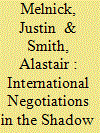

|
|
|
|
|
| Summary/Abstract |
Within a formal model of international agreements in the shadow of renegotiations and domestic competition, we highlight three important ways elections shape international agreements. Elections determine who will be in control of policy in the future, which affects how leaders bargain today. Elections also determine the deals policymakers will agree to. Finally, proposers have the opportunity to shape the contours of domestic political competition with what is offered in pre-electoral bargaining. We identify that several canonical results in the literature – like the Schelling conjecture or the idea that hawkish leaders have an innate bargaining advantage over dovish leaders – only hold under certain restrictions on how voters evaluate their leaders. In contrast, we show paradoxically that when voters are prospective, electoral incentives shade the ability for domestic leaders to negotiate better deals for their publics. Counterintuitively, this leads to hawks agreeing to more conciliatory agreements than doves.
|
|
|
|
|
|
|
|
|
|
|
|
|
|
|
|
| 9 |
ID:
143298
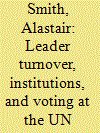

|
|
|
|
|
| Summary/Abstract |
Using evidence from voting in the UN General Assembly (UNGA), this article shows that leader turnover, especially in small coalition, nondemocratic systems, increases the likelihood of policy realignment. Autocrats who are beholden to only a small proportion of the population represent the foreign policy interests of their small number of supporters. When leader turnover occurs, the interests represented often shift too and this results in an increased volatility and regression toward a neutral position of a nation’s alignment at the United Nations vis-à-vis the United States. While such realignments can offer an opportunity to reduce enmity between states, they can also signal growing differences between friends. The impact of leaders change in large coalitions produces more moderate shifts in alignments.
|
|
|
|
|
|
|
|
|
|
|
|
|
|
|
|
| 10 |
ID:
057026
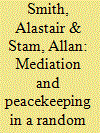

|
|
|
| 11 |
ID:
100281
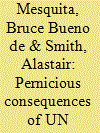

|
|
|
|
|
| Publication |
2010.
|
| Summary/Abstract |
ations elected to the United Nations Security Council (UNSC) as temporary members have lower levels of economic growth, become less democratic, and experience more restrictions on press freedoms than comparable nations not elected to the UNSC. Using regression and matching techniques the authors show, for instance, that over the two-year period of UNSC membership and the following two years during which a nation is ineligible for reelection, UNSC nations experience a 3.5 percent contraction in their economy relative to nations not elected to the UNSC. The detrimental effects of UNSC membership are strongest in nondemocratic nations. The authors contrast these results with the growing evidence that nations elected to the UNSC receive greater development assistance.
|
|
|
|
|
|
|
|
|
|
|
|
|
|
|
|
| 12 |
ID:
090442
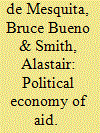

|
|
|
|
|
| Publication |
2009.
|
| Summary/Abstract |
We model how the size of a leader's support coalition and government revenues affect trades between policy concessions and aid. We find that aid benefits donor and recipient leaders, while harming the recipient's, but not the donor's, citizenry. The willingness to grant policy concessions for aid depends on how easily leaders can reimburse supporters for their concession. As coalition size increases, incumbents rely more on public goods to reward supporters, making it difficult to compensate for policy concessions. Small-coalition leaders rely more on private goods to retain office, making it easier for them to grant policy concessions for aid. Empirical tests of bilateral aid transfers by Organization for Economic Cooperation and Development (OECD) nations between 1960 and 2001 support the predictions that (1) aid is given by wealthy, large-coalition systems; (2) relatively poor, small-coalition systems are most likely to get aid; but, (3) conditional on receiving aid, the amount increases as the recipient's coalition size, wealth, and policy salience increase. Evidence suggests that OECD members have little humanitarian motivation for aid giving.
|
|
|
|
|
|
|
|
|
|
|
|
|
|
|
|
| 13 |
ID:
092047
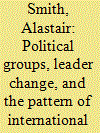

|
|
|
|
|
| Publication |
2009.
|
| Summary/Abstract |
Nations are politically heterogeneous and which group is in political ascendency shapes the nature of interstate cooperation through two mechanisms. First, groups differ in the benefits they receive from cooperation. This affects which groups can commit to cooperate. Second, a nation may selectively withhold cooperation from one group to influence the domestic political competition between groups in another nation. By integrating political competition between leaders of different groups under different institutional rules into a prisoner's dilemma model of international cooperation, the theory generates hypotheses relating leader turnover, group membership, and patterns of cooperation.
|
|
|
|
|
|
|
|
|
|
|
|
|
|
|
|
| 14 |
ID:
152410
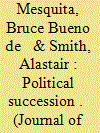

|
|
|
|
|
| Summary/Abstract |
In addition to everyday political threats, leaders risk removal from office through coups and mass movements such as rebellion. Further, all leaders face threats from shocks such as downturns in their health, their country’s economy, or their government’s revenue. By integrating these risks into the selectorate theory, we characterize the conditions under which each threat is pertinent and the countermoves (purges, democratization, expansion of public goods, and expansion of private benefits) that best enable the leader to survive in office. The model identifies new insights into the nature of assassins; the relative risk of different types of leader removal as a function of the extant institutions of government; and the endogenous factors driving better or worse public policy and decisions to democratize or become more autocratic. Importantly, the results highlight how an increase in the risk of deposition via one means intensifies other removal risks.
|
|
|
|
|
|
|
|
|
|
|
|
|
|
|
|
| 15 |
ID:
057994
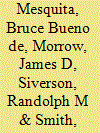

|
|
|
| 16 |
ID:
065004
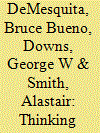

|
|
|
|
|
|
|
|